 Petzlover
Petzlover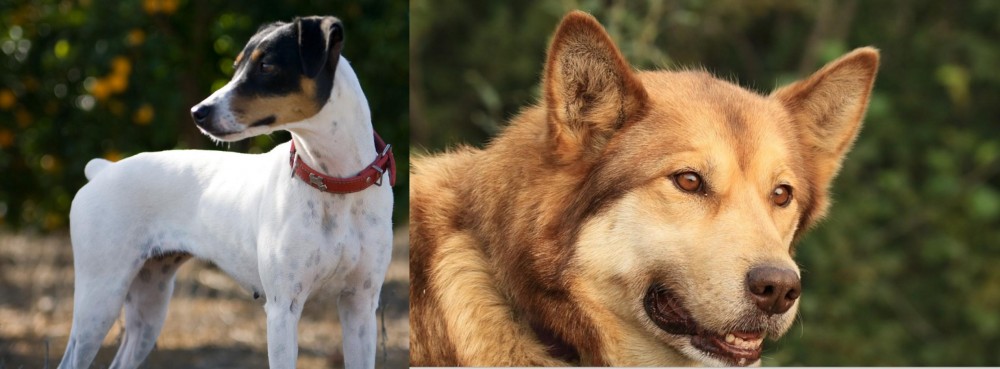 Ratonero Bodeguero Andaluz is originated from Spain but Seppala Siberian Sleddog is originated from Canada. Ratonero Bodeguero Andaluz may grow 15 cm / 5 inches shorter than Seppala Siberian Sleddog. Ratonero Bodeguero Andaluz may weigh 14 kg / 30 pounds lesser than Seppala Siberian Sleddog. Ratonero Bodeguero Andaluz may live 3 years more than Seppala Siberian Sleddog. Both Ratonero Bodeguero Andaluz and Seppala Siberian Sleddog has almost same litter size. Ratonero Bodeguero Andaluz requires Low Maintenance. But Seppala Siberian Sleddog requires Moderate Maintenance
Ratonero Bodeguero Andaluz is originated from Spain but Seppala Siberian Sleddog is originated from Canada. Ratonero Bodeguero Andaluz may grow 15 cm / 5 inches shorter than Seppala Siberian Sleddog. Ratonero Bodeguero Andaluz may weigh 14 kg / 30 pounds lesser than Seppala Siberian Sleddog. Ratonero Bodeguero Andaluz may live 3 years more than Seppala Siberian Sleddog. Both Ratonero Bodeguero Andaluz and Seppala Siberian Sleddog has almost same litter size. Ratonero Bodeguero Andaluz requires Low Maintenance. But Seppala Siberian Sleddog requires Moderate Maintenance
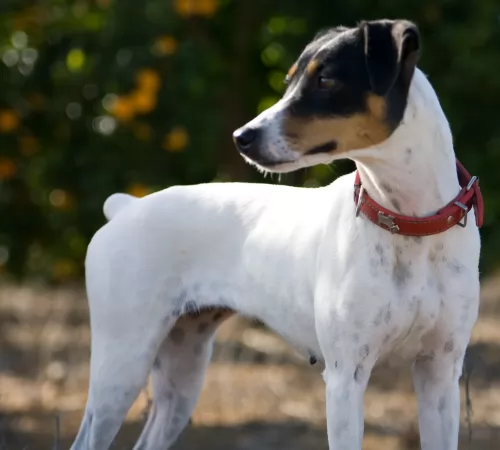 Long ago the English visited Spain to sample their wines, bringing with them smooth coated English Fox Terriers which were later crossed with other dog breeds of the area.
Long ago the English visited Spain to sample their wines, bringing with them smooth coated English Fox Terriers which were later crossed with other dog breeds of the area.
It is believed that the Andalusia Ratter’s ancestors were smooth coated fox terriers. The Club Nacional del Perro Andaluz Ratonero Bodeguero was established and in 1993 a standard for the breed was set.
It is only fairly recently that the breed was recognized by the Royal Canine Society of Spain but it isn’t recognized by any of the major kennel clubs.
 This is a rare working dog breed whose job it has been to pull sleds. The Seppala Siberian Sleddog hails from Canada and was regarded as the same dog breed as the Siberian Husky.There is the International Seppala Siberian Sleddog Club which works to preserve this amazing dog as a working breed.
This is a rare working dog breed whose job it has been to pull sleds. The Seppala Siberian Sleddog hails from Canada and was regarded as the same dog breed as the Siberian Husky.There is the International Seppala Siberian Sleddog Club which works to preserve this amazing dog as a working breed.
It was during the 1990s that the breed was recognized as a new breed. In 2002 the Seppala Siberian Sleddog lines found their way to the USA .
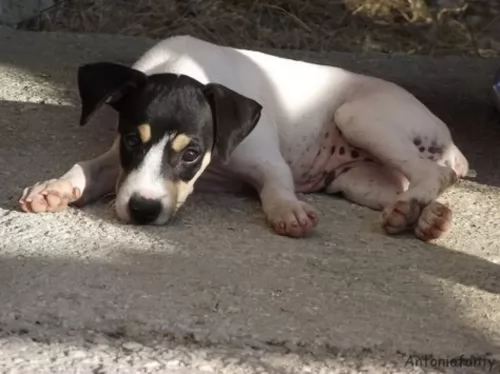 Also known as the Spanish Jack Russell, the Ratonero Bodeguero Andaluz looks very similar to this popular Jack Russell Terrier.
Also known as the Spanish Jack Russell, the Ratonero Bodeguero Andaluz looks very similar to this popular Jack Russell Terrier.
He is a small to medium sized dog with a lean, muscular body. The Ratonero developed in the south of Spain and is thought to be a mix of local ratting dogs and Fox Terriers. This ensured a quick, agile hunter.
The dog stands at between 35 – 43cm in height and weighs 6 - 9kg. The dog’s head is fairly small with dark brown eyes and half erect-half floppy ears. The coat is mainly white with some freckling. It is short and smooth with shades of black and tan covering the facial area. Some of these dogs are born with a natural bob-tail.
These dogs are known to have robust, hearty, happy personalities, full of the joys of living. They get on well with children as well as other pets if they have grown up with them.
Introductions should be slow if one of these dogs are brought into a home where there are already other pets. He is a very active breed and will be requiring plenty of mental stimulation and physical exercise.
They can provide quite a bit of entertainment for their human families as they can become quite clownish. They’re the kind of dogs that can adapt to life in the countryside or the city.
 The Seppala Siberian Sleddog is a medium-sized dog that stands at between 56 to 58cm in height and weighs between 18 to 23kg.
The Seppala Siberian Sleddog is a medium-sized dog that stands at between 56 to 58cm in height and weighs between 18 to 23kg.
It’s a beautiful wolf-like looking dog that used to be the same breed as the Siberian Husky, but it is now considered a separate breed.
The legs of this dog are longer, and they’re slightly more slender and lighter. The ears too, are taller and held very erect. The bushy tail is held high, curving over the back when alert.
The thick coat is medium length and there is also a thick undercoat. Coat colors vary and are wolf-like too - white, cream, grey, black and some reddish rusty colors. Eyes can be blue or brown or the dog can even have one brown eye and one blue.
Because this is an active working breed, he will need some robust exercise. Neglecting this side of him will result in a bored dog that howls a lot.
He is a high energy dog breed and won’t be content with a walk every day. When you go cycling or jogging, you can definitely count him in as he will like nothing more than to run beside you. If you are lucky to live near the beach, a tennis racquet to send the ball flying across the sand will please him no end.
He will need training and socialization of course, and you won’t have trouble training him as he is an intelligent dog. He isn’t the kind of dog that slots easily into life in the city, and will ideally suit a property with large grounds where he can run and play.
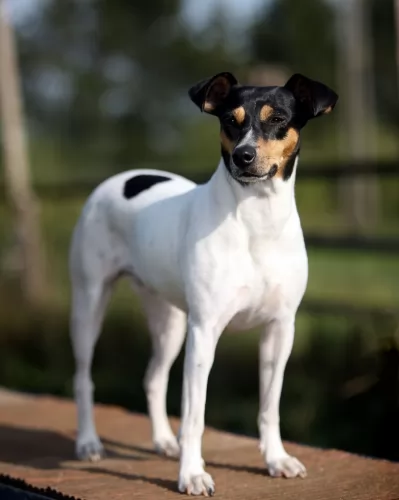 Your Ratonero Bodeguero Andaluz to this day is a ratter, always alert and ready to spring on prey. He is always lively and friendly, and with his loving nature, makes a splendid companion for his human family.
Your Ratonero Bodeguero Andaluz to this day is a ratter, always alert and ready to spring on prey. He is always lively and friendly, and with his loving nature, makes a splendid companion for his human family.
He is also a stubborn dog, liking to go his own way, and therefore will require training and socialization. He is an adaptable little dog too and when you bring him into your home he is willing to adapt to your way of life and become a loyal and loving member of your family.
 The Seppala Siberian Sleddog has always been a working dog so he will need lots of varied forms of exercise. He makes a splendid family pet as he isn’t an aggressive dog.
The Seppala Siberian Sleddog has always been a working dog so he will need lots of varied forms of exercise. He makes a splendid family pet as he isn’t an aggressive dog.
He does however make a good watchdog and will bark and warn you of strangers approaching.These beautiful wolf-like dogs are guaranteed to make you a loving, loyal pet, and they love nothing more than to be close to all his human family.
Treat him as a member of the family and you’ll be rewarded by having his fantastic friendship.
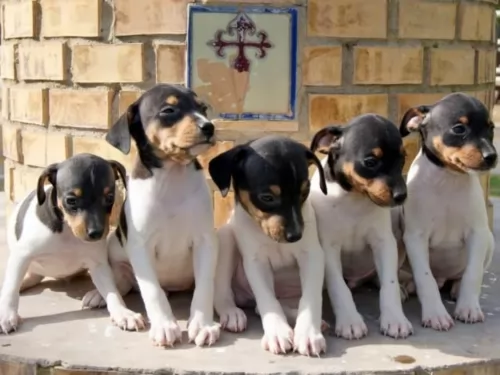 With good care, your Andalusian Ratter isn’t likely to get sick, but still, you would be better off knowing about some of the common dog diseases your pet could get.
With good care, your Andalusian Ratter isn’t likely to get sick, but still, you would be better off knowing about some of the common dog diseases your pet could get.
This is usually seen in young dogs where there is lameness in the hind legs and hip pain. It is believed that Legge Perthe’s occurs because of a genetic predisposition, and when it develops, there is sadly no cure.
Skin infections may seem fairly mild but nothing can be further from the truth. They can be painful and frustrating. Skin redness, dryness, itchiness and pain can cause your pet to lick and bite and make the situation worse. If your pet is being driven crazy by a skin irritation, get him to the vet who will do a complete physical examination.
Other diseases to be aware of include hip dysplasia, obesity, epilepsy and bloat.
 The Seppala Siberian Sleddog, just like most other dogs, can suffer from any one of the common dog ailments there are. These illnesses are cancer, hip dysplasia and eye disease.
The Seppala Siberian Sleddog, just like most other dogs, can suffer from any one of the common dog ailments there are. These illnesses are cancer, hip dysplasia and eye disease.
You are more than likely not to see any of these illnesses with your pet, but it’s being a responsible dog owner to be aware of them and to get your pet to the vet if necessary.
Cataracts are an imperfection in the lens of the dog’s eye. The lens should be clear, but a cataract can start off small and then grow much larger, causing blindness in the dog. Cataracts happen when the cells are damaged, and diabetes can cause cataracts as can exposure to ultraviolet light. It is also an hereditary disease.
Most times dogs with cataracts can still see, but in the event of mature cataracts, your canine friend can undergo surgery to remove them.
This is another common dog disease. It can be painful for dogs, with either one or both hips being affected. Hip dysplasia can affect both young and old dogs. It can be sad seeing your active pet becoming reluctant to play. He may also have difficulty getting up from a lying down position.
There is treatment for hip dysplasia, and you will want to make sure your pet is as mobile and pain free as possible.
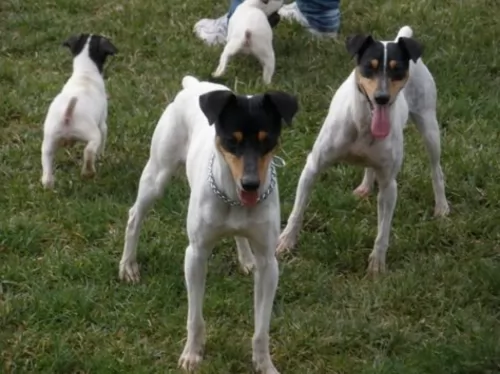 This is a fairly low maintenance dog as the short smooth coat will be easy to brush twice a week.
This is a fairly low maintenance dog as the short smooth coat will be easy to brush twice a week.
Check him over for unusual lumps, trim his nails and check inside his ears, look into his eyes to ensure they are bright and alert and look inside his mouth to make sure he doesn’t have any rotten teeth.
Have your pet neutered or spayed if you want to avoid puppies. This can be beneficial for your pet’s health too.
Feed your Ratonero Bodeguero Andaluz only the best food there is. If you opt for commercially manufactured food, make sure its full of vitamins and minerals. Your little pet will want consistency and simplicity with his food to avoid digestive problems.
Try and provide him with some home-made food which can be added to the dry kibble twice a week as a treat. Boiled chicken, brown rice or pasta and spinach, sweet potatoes and carrots all chopped up ad mixed into the dry kibble will ensure your pet’s health.
Some raw meat added in occasionally will also go towards ensuring his good health.
Always make sure he has access to fresh, cool water.
Provide him with a safe, dry, warm, comfortable place to sleep.
Get him to the vet when you see he is sick.
Ensure he has sun and shade in the garden.
Never ever leave him in a hot car.
 The thick coat of the Seppala Siberian Sleddog will need to be brushed at least twice a week. The coat sheds heavily a couple of times a year and brushing may even be necessary once a day during this heavier shedding period.
The thick coat of the Seppala Siberian Sleddog will need to be brushed at least twice a week. The coat sheds heavily a couple of times a year and brushing may even be necessary once a day during this heavier shedding period.
Just like human beings, you can enhance your dog’s health and longevity by giving him the best food there is. Commercially manufactured dog foods, when carefully selected, can be a good, choice and they’re convenient too.
It is advised to try and go for the high quality ones known for their natural, quality ingredients. Always read the labels because you'll be surprised to see how some of the inferior dog brands pack their foods with toxic ingredients.
To provide your Seppala with just a bit of variety in his diet, give him some home-made food. It can be added into the dry kibble about twice a week as a treat. Boil brown rice and chicken in a pot and add in sweet potatoes, carrots and spinach. Chop all this up and give it to your dog in small portions.
To avoid skin infections, try to include some raw meat into his diet occasionally. Never leave your pet without a constant source of fresh, cool water